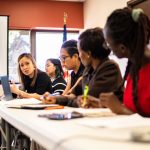Reflections on Asian Pacific American Heritage Month
May is Asian Pacific American Heritage Month, a time to think about our long history and contributions in the United States. Among the first Asians who came to the country were Filipinos who arrived in 1587 in California. Asian Pacific Americans have served in every major conflict following the War of 1812, including defending the Union at Gettysburg. We have received Congressional Medals of Honor for bravely defending our nation.
This month we celebrate that history, and build on it as we face today’s challenges and stand up to right today’s wrongs.
Our history here has been one of exclusion, family separation, labor exploitation, racial profiling, detention, and abrogation of our Constitutional and human rights.
Asian contract laborers were recruited for back-breaking work at lower wages and worse conditions than white workers, while federal policy denied them U.S. citizenship and did not allow them to bring their families here. American immigration policy practically began with the 1882 Chinese Exclusion Act, the original travel ban, which was expanded to bar people from the rest of Asia. For a long period until 1943 when the Exclusion Act was repealed, millions of European immigrants arrived while the merest trickle of Asians were allowed entry into the U.S.
Locally, Asian Pacific Americans developed fields, helped log forests, labored in fisheries and factories, and helped build our economy. Boeing’s first aeronautical engineer, Wong Tsu, was Chinese.
In 1965, racial quotas were finally eliminated, allowing more Asians to immigrate. However, our broken immigration system means that families are still separated for years or more, and often unable to reunite.
We are now the fastest-growing racial group nationally and in King County, where we make up nearly 17 percent of the population. In this region, Asian Americans and Pacific Islanders also constitute the largest immigrant and refugee group, and we represent the broadest religious, cultural, linguistic and ethnic diversity.
Locally, Asian Pacific Americans have stood up for civil and human rights with bravery and distinction.
Seattleite Gordon Hirabayashi was imprisoned for defending the Constitutional rights of all Americans when he challenged the federal government’s forced incarceration of Japanese Americans during World War II. More than 40 years later, the Ninth Circuit Court of Appeals vacated his conviction for violating curfew and the exclusion order.
Silme Domingo and Gene Viernes of the Alaska Cannery Workers Association joined leaders of the United Construction Workers and United Farmworkers to form the Northwest Labor and Employment Law Office (LELO) in Seattle, and won class-action lawsuits challenging racially segregated and unequal working conditions in the canneries. After their politically-motivated assassinations, the Committee for Justice for Domingo and Viernes successfully linked their murders to former Philippine president Ferdinand Marcos, who was found liable for the deaths of the two men.
And now, there is a great need for Asian Pacific Americans to stand once again against injustice and intolerance.
Current anti-immigrant, anti-refugee federal policies and Executive Orders threaten our immigrant, refugee and Muslim families. Xenophobic, racist and Islamophobic rhetoric inspires hate crimes against many religious and racial groups, notably Muslims, Sikhs and people of color.
Calls for a Muslim registry and ban in the name of national security recall the mother of all Executive Orders, 9066, which led to 120,000 innocent Japanese Americans and their immigrant parents being racially profiled, rounded up and incarcerated in American concentration camps. The first Japanese Americans forced from their homes were from Bainbridge Island.
There are 1.5 million undocumented Asians and Pacific Islanders in our country, including 57,000 in our state, who live in fear of being deported. Southeast Asian and Asian Pacific American families have been ripped apart, with some who grew up here deported to countries they know little about.
Today, our communities join the majority of Americans against racial and religious profiling, and work for a better world for all. Asian Pacific American attorneys and attorneys general defended passengers facing the Muslim ban at the nation’s airports and in the courts. We have been active in the civil rights movement, and young Asian Pacific Americans stand with the Black Lives Matter movement in demanding justice and police accountability. Pacific Islanders lead activism for climate justice. We can also be the swing vote in critical elections.
Contrary to the model minority myth, our community has faced severe discrimination through the years, but we have a proud history of resistance.
Our resistance is part of the movement for social justice, not only here in Seattle, and not only in May, but a movement working for a more just and peaceful world for all.
Reprinted guest blog by former ACRS executive director Diane Narasaki originally published May 29, 2018, on the Seattle Foundation website.






